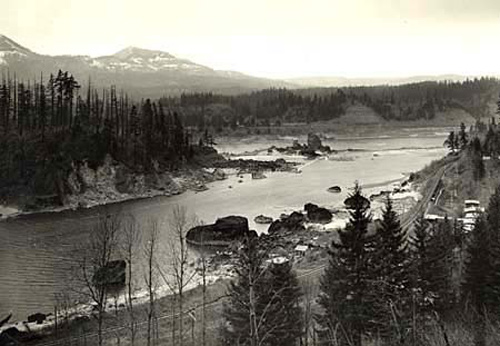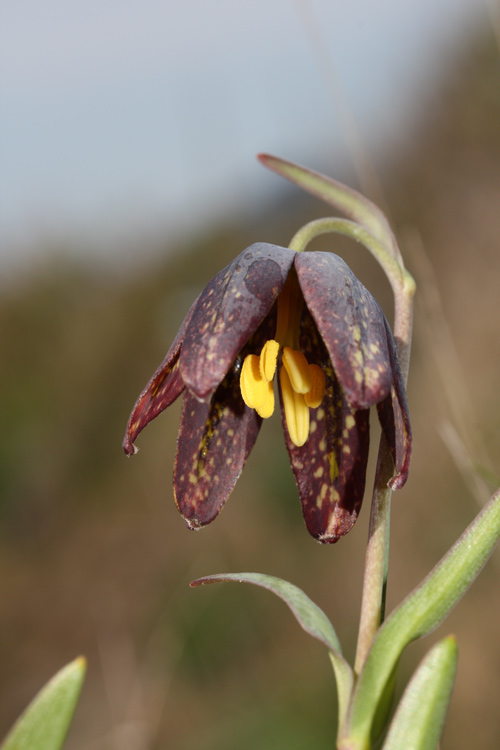The men tow and ferry the dugout canoes to reach the portage around the Cascades of the Columbia. Before ferrying, Lewis collects a checker lily specimen on “Brant Island”. A canoe breaks loose, loses all its cargo, and is returned by local villagers. In Washington City, President Thomas Jefferson seeks the name of the Arikara chief who recently died.
The Stolen Tomahawk
by Yellowstone Public Radio[1]Originally aired weekdays by Yellowstone Public Radio during the Bicentennial observance of 2003-2006. Narrated by Hal Hansen. Scripts by Whit Hansen and Ed Jacobson. Produced by Leni Holliman. © … Continue reading
The upper point of Brant Island is center left. The men towed the dugouts up the channel in the foreground and then ferried across the main channel to the far side. From there, they continued towing the dugouts up the river (left-to-right) to reach the portage.
Towing Dugout Canoes
We set out early and droped down the channel to the lower end of brant Island from whence we drew them up the rapid by a cord about a quarter of a mile which we soon performed
—Meriwether Lewis
Crossing the River
in passing the river which is here about 400 yds. wide the rapidity of the currant was such that it boar us down a considerable distance notwithstanding we employed five oars.
—Meriwether Lewis
Expensive Skin
on entering one of these [The Watlala] lodges, the natives offered us a sheepskin for sail, than which nothing could have been more acceptable except the animal itself
—Meriwether Lewis
Reaching the Portage
as we had but one sufficient toerope and were obliged to employ the cord in geting on our canoes the greater part of the way we could only take them one at a time which retarded our progress very much. by evening we arrived at the portage on the North side where we landed and conveyed our bagage to the top of the hill about 200 paces distant where we formed a camp.
—Meriwether Lewis
Canoe Adrift
we had the canoes drawn on shore and secured. the small canoe got loose from the hunters and went a drift with a tin vessel and tommahawk in her; the Indians caught her at the last village and brought her up to us this evening for which service we gave them a couple of knives; the canoe overset and lost the articles which were in her.—
—Meriwether Lewis
Checker Lily
Fritillaria affinis (previously F. lanceolata)
Photo © 2009 Walter Siegmund. Permission to use granted under the Creative Commons Attribution-ShareAlike 3.0 Unported license.
Checker Lily Specimen
Specemin of lilliacious plant obtained on Brant Island 10th of apl 1806. the root of this plant is a squawmus bulb and is eaten by the natives. the Clah-clel-lar opposite this Island call it tel-lak-thil-pah
—Meriwether Lewis[2]Moulton, ed. Herbarium, specimen 71.
Too Né’s Name
Secretary of War Henry Dearborn answers Thomas Jefferson‘s query as to the name of the Arikara chief who recently died while visiting Washington City as a member of a delegation organized by Lewis and Clark.
10 Apr. 1806
Sir
The name of the Ricara Chief, as well as I could make it out from the three Interpreters was Ankedoucharo. according to Gravelins [Joseph Gravelines] pronounciation the letters would be thus divided, Ank-e-douch-a-ro, but I doubt whether they are correct.
Yours,
H. Dearborn[3]Henry Dearborn to Thomas Jefferson, Founders Online, National Archives, founders.archives.gov/documents/Jefferson/99-01-02-3543. [from The Papers of Thomas Jefferson]; also in Letters of the Lewis … Continue reading
Weather Diary
State of weather at rise
Wind at rise
State of the weather at 4 P.M. Wind at 4 P.M. River cloudy after rain W cloudy after rain S W raised 1 in. some snow fell on the river hills last night. morning cold, slight sowers through the day.
—Meriwether Lewis[4]To assist the reader of this web page, the date column is not presented, the “State of the Columbia River” columns have been merged, and some abbreviations have been spelled out.
Experience the Lewis and Clark Trail
The Lewis and Clark Trail Experience—our sister site at lewisandclark.travel—connects the world to people and places on the Lewis and Clark Trail.
Plan a trip related to April 10, 1806:

Notes
| ↑1 | Originally aired weekdays by Yellowstone Public Radio during the Bicentennial observance of 2003-2006. Narrated by Hal Hansen. Scripts by Whit Hansen and Ed Jacobson. Produced by Leni Holliman. © 2003 by Yellowstone Public Radio. |
|---|---|
| ↑2 | Moulton, ed. Herbarium, specimen 71. |
| ↑3 | Henry Dearborn to Thomas Jefferson, Founders Online, National Archives, founders.archives.gov/documents/Jefferson/99-01-02-3543. [from The Papers of Thomas Jefferson]; also in Letters of the Lewis and Clark Expedition with Related Documents: 1783-1854, 2nd ed., ed. Donald Jackson (Urbana: University of Illinois Press, 1978), 305–06. |
| ↑4 | To assist the reader of this web page, the date column is not presented, the “State of the Columbia River” columns have been merged, and some abbreviations have been spelled out. |


